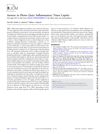 7 citations,
January 2017 in “Journal of cosmetology & trichology”
7 citations,
January 2017 in “Journal of cosmetology & trichology” Good nutrition is crucial for healthy hair and can help with hair loss without medication.
6 citations,
September 2023 in “International journal of molecular sciences” Oxidative stress worsens PCOS by damaging cells and disrupting metabolism, suggesting antioxidant treatments might help.
5 citations,
September 1991 in “Veterinary dermatology” Pygmy goats with seborrhoeic dermatitis showed skin symptoms and temporary improvement with corticosteroids, but the cause and inheritance of the disease remain unknown.
 4 citations,
January 2020 in “Frontiers in Physiology”
4 citations,
January 2020 in “Frontiers in Physiology” Good feather growth in poultry needs the right balance of proteins, amino acids, minerals, and vitamins.
 4 citations,
January 2011 in “International Journal of Trichology”
4 citations,
January 2011 in “International Journal of Trichology” Accidental findings have led to new hair treatment discoveries, like using blood pressure and diabetes medications for hair loss and unwanted hair.
 1 citations,
August 2022 in “International journal of biological and chemical sciences”
1 citations,
August 2022 in “International journal of biological and chemical sciences” Iodine-deficient diets and antithyroid substances affected rat growth and behavior, but most adapted with positive weight gain.
 1 citations,
August 2022 in “Медицинский совет”
1 citations,
August 2022 in “Медицинский совет” The treatment with an oral drug and topical lotion is effective and well-tolerated for hair loss after COVID-19.

The conclusion is that hair supplement ingredients may be unsafe and should be disclosed and proven safe before use.
 1 citations,
November 2015 in “Lʹvìvsʹkij klìnìčnij vìsnik”
1 citations,
November 2015 in “Lʹvìvsʹkij klìnìčnij vìsnik” Correcting trace element imbalances may help reduce alopecia areata symptoms.
 October 2024 in “Molecular Nutrition & Food Research”
October 2024 in “Molecular Nutrition & Food Research” Vitamin and mineral imbalances may affect hair loss, but more research is needed.
 April 2024 in “Skin appendage disorders”
April 2024 in “Skin appendage disorders” Environmental pollutants can damage hair health and cause hair loss.
 March 2024 in “CRC Press eBooks”
March 2024 in “CRC Press eBooks” Nutraceuticals can effectively manage hormonal imbalances and related health issues.
 August 2023 in “Journal of The American Academy of Dermatology”
August 2023 in “Journal of The American Academy of Dermatology” Valproic acid, a common antiepileptic medication, can cause reversible hair loss in patients.
 May 2023 in “Elsevier eBooks”
May 2023 in “Elsevier eBooks” Some nutritional supplements may help thicken hair in people with hair loss, but taking too much can cause side effects.
 January 2023 in “Voennaâ medicina”
January 2023 in “Voennaâ medicina” Hair loss in women can improve with iron and vitamin supplements if caused by iron deficiency.
Restolin Hair Supplement may help hair growth but lacks FDA approval and clinical trial evidence.
 April 2022 in “Anti-cancer agents in medicinal chemistry”
April 2022 in “Anti-cancer agents in medicinal chemistry” Some existing medicines show promise as safe treatments to protect against the side effects of radiation therapy.
 October 2021 in “Interfaces Científicas”
October 2021 in “Interfaces Científicas” Nutricosmetics for hair treatment often contain biotin, pyridoxine, zinc, and other nutrients, but more research and professional guidance are needed for their use.
 January 2019 in “Springer eBooks”
January 2019 in “Springer eBooks” Some chemicals and drugs can cause hair loss, which usually grows back after stopping the treatment.
 July 2018 in “Journal of College of Medical Sciences-nepal”
July 2018 in “Journal of College of Medical Sciences-nepal” Women with certain types of hair loss may have low iron levels.
 July 2018 in “International journal of clinical & experimental dermatology”
July 2018 in “International journal of clinical & experimental dermatology” Eat a balanced diet for healthy hair; only use supplements if you have a proven nutrient deficiency.
 January 2017 in “International journal of clinical & experimental dermatology”
January 2017 in “International journal of clinical & experimental dermatology” Eating a balanced diet with vitamins, micronutrients, and antioxidants is important for hair health and can help with hair loss.
 January 2017 in “Springer eBooks”
January 2017 in “Springer eBooks” Eating a balanced diet with specific nutrients can help manage menopause symptoms and prevent related health issues.
January 2022 in “Clinical Cases in Dermatology” A man has a common skin condition called seborrheic dermatitis, treated with special shampoos and sometimes medication.
The chapter explains causes of hair loss and excessive hair growth in animals.
 March 2017 in “International journal of current advanced research”
March 2017 in “International journal of current advanced research” Medicated shampoos can help reduce hair loss associated with dandruff.
 March 2014 in “Journal of clinical microbiology”
March 2014 in “Journal of clinical microbiology” Kerion, a scalp fungal infection, requires lab confirmation and is treated with antifungal medication and medicated shampoo.
December 2021 in “Vestnik Rossiĭskoĭ akademii meditsinskikh nauk / Rossiĭskaia akademiia meditsinskikh nauk” Personalized vitamin and trace element treatment improves hair density and reduces hair loss in men with early-stage androgenic alopecia.
 October 2022 in “Research, Society and Development”
October 2022 in “Research, Society and Development” Vitamins and minerals don't significantly affect hair loss treatment in patients with telogen effluvium.
 February 2022 in “International journal of KIU”
February 2022 in “International journal of KIU” Certain genes and nutrients like vitamin D, zinc, and omega fatty acids affect COVID-19 severity and infection risk.
























